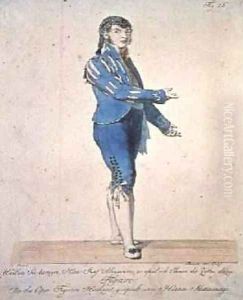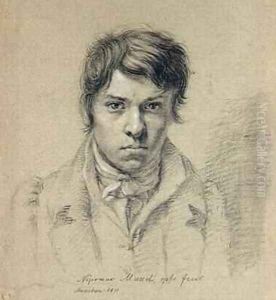Johann Nepomuk Muxel Paintings
Johann Nepomuk Muxel was an Austrian painter, primarily recognized for his contributions to landscape and religious art. Born in 1793 in Au, in the Bregenzerwald region of Vorarlberg, Muxel developed an early interest in art, nurtured by the picturesque landscapes of his native Austria. His talent was evident from a young age, leading him to pursue formal training. Although detailed records of his education are sparse, it is known that Muxel traveled extensively throughout Europe, which greatly influenced his artistic development. His works often reflect a deep appreciation for the natural beauty of the Alpine landscapes, combined with a keen attention to detail and a vibrant use of color.
Muxel's career spanned several decades of the 19th century, a period marked by significant changes in the art world. He managed to carve a niche for himself by focusing on the genres where he felt most at home: landscapes and religious themes. His landscapes, in particular, were celebrated for their realism and ability to capture the sublime nature of the Alps. Muxel was also deeply religious, which influenced much of his work. His religious paintings are noted for their emotional depth and the skillful use of light to evoke a sense of divine presence.
Despite his contributions to Austrian art, Johann Nepomuk Muxel remains a relatively obscure figure in the broader European art history. He did not belong to any particular school or movement, which, while allowing him a great degree of artistic freedom, may have contributed to his relative obscurity. Nevertheless, his works are cherished for their beauty and technical skill, and they continue to be appreciated by collectors and enthusiasts of Austrian art.
Muxel's legacy is somewhat limited by the lack of widespread recognition outside his native Austria, but within the country, he is celebrated as an important figure in the 19th-century art scene. His paintings are preserved in various collections and museums, serving as a testament to his skill and passion for the natural world and religious subjects. Johann Nepomuk Muxel passed away in 1871, leaving behind a body of work that, while not widely known internationally, remains an integral part of Austria's artistic heritage.

